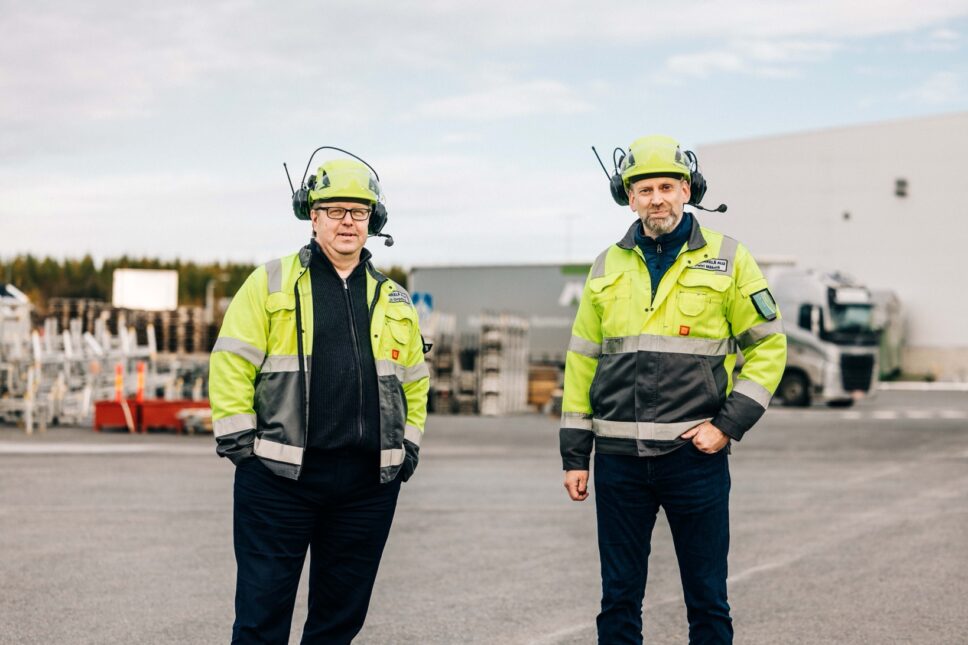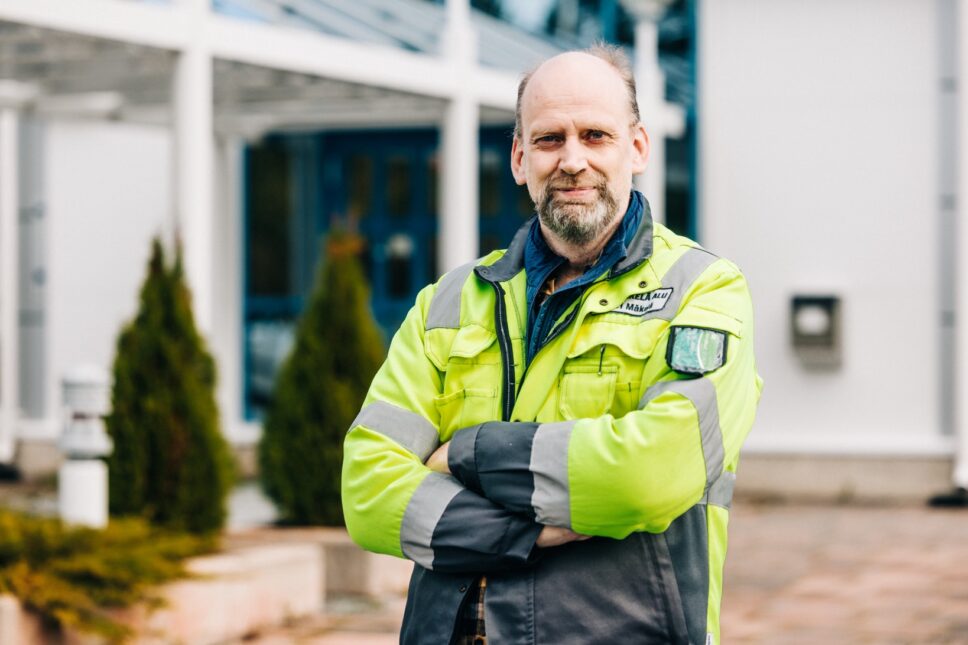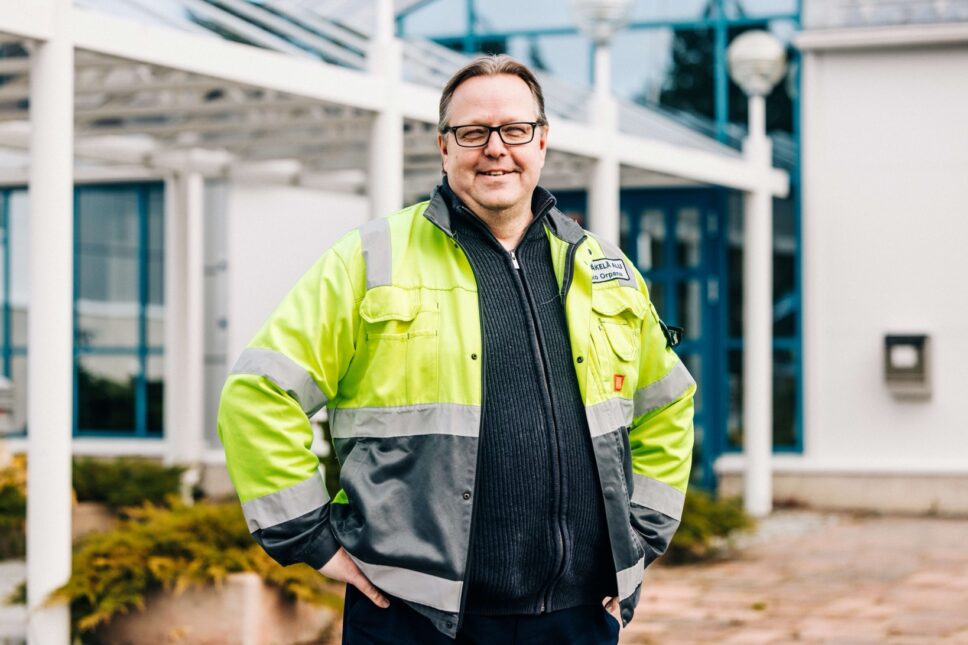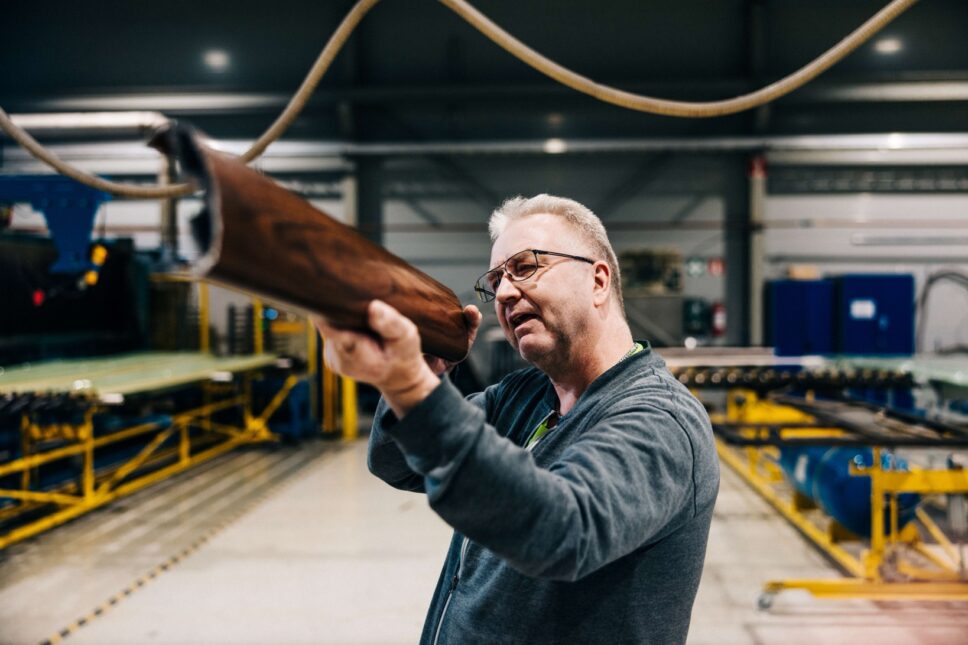Mäkelä Alu aims to become carbon neutral by 2025 – “We have the duty and ability to lead the way”

Mäkelä Alu, based in South Ostrobothnia, is speeding towards carbon-neutral production by 2025. The company is spurred by concern for the climate and stimulated by state energy investment subsidies. “I think operators who have the ability and a head start over others also have a duty to lead the way differently from the mainstream,” says Petri Mäkelä, Chair of the Board of Directors.
Mäkelä Alu provides aluminium profiles and related services. It aims to make its production and internal logistics carbon neutral by 2025. Why has the company set itself such a tight deadline? After all, Finland’s national climate target is for 2035.
“I do not mean to sound arrogant, but we are doing it because we can,” says Marko Opana, CEO of Mäkelä Alu.
And it is a matter of urgency.
Petri Mäkelä, Chair of Mäkelä Alu’s Board of Directors and one of the owners of the family company, agrees with Orpana. Both have a shared personal concern as fathers of similarly-aged children.
I have two sons, aged 16 and 18. Unless we take real action now, this planet will no longer exist by the time they are 50,” says Orpana.
“I have two sons, aged 16 and 18. Unless we take real action now, this planet will no longer exist by the time they are 50.”
Both agree that public resources will be insufficient unless the private sector takes action. They say that the public sector and state carbon neutrality targets seem “rather unambitious”.
“General norms are formed according to a general level and conservative expectation that states and enterprises, on average, have the capability to achieve,” Mäkelä says.
- Mäkelä Alu is a family company established in 1937. The company manufactures aluminium profiles and provides storage and surface treatment services. Its customers include manufacturers of windows, doors, balcony glazing and various rails, light fittings, and solar panels.
- Mäkelä Alu employs 260–270 people in Alajärvi and Voikkaa, Kouvola. It also has a sales subsidiary in Sweden.
- The company’s net sales were EUR 126.3 million in 2022.
- The most important export markets are Nordic countries, Baltic countries, and Germany.
- Mäkelä Alu’s EUR 10 million development project aims to significantly reduce emissions, combat climate change and use energy more efficiently.
- The aluminium used as a raw material is sourced from Nordic suppliers to ensure the sustainability of the material and its overall environmental load.
- The company also makes AluPure, which is 100% recycled aluminium.
- In the future, 130 square metres of solar panels will be installed in the factory area. The solar panels are included in the company’s RRF project.
- The company has determined the emissions of its production process, all the way from the mine to the moment the products leave the production plant’s gates.
He also stresses the company’s corporate responsibility.
“I think operators who have the ability and a head start over others also have a duty to lead the way differently from the mainstream.”
Naturally, the business fundamentals also favour a green transition.
“This is our way of building the company’s future. The companies that take action at the right time, with the right volumes and skills, will be the ones that survive,” Mäkelä says.
Excel running at a furious pace
And, in Mäkelä’s opinion, the 2025 deadline is not even particularly tight. The company has monitored its carbon footprint using in-house techniques for 18 years. It began setting more stringent targets for its carbon footprint 10 years ago.
“Against this perspective, 2025 does not seem much of a stretch. But if we had only just started thinking about this last year, the outlook might be different,” Mäkelä says.

The company uses aluminium as a raw material and carefully chooses its suppliers. Its two main suppliers are based in Norway.
“We use the purest aluminium that money can buy,” Orpana states.
However, the downturn in construction has cast dark clouds over the 2025 target. Mäkelä Alu’s customers include manufacturers of windows, doors, balcony glazing and various rails, light fittings, and solar panels.
“We also need to be careful not to jeopardise our business and our future. But that is what Excel is for. It has been running at a furious pace. We want to believe the target is achievable,” Orpana says.
“At least we have not taken our foot off the gas yet,” Mäkelä adds.
EUR 10 Million investment in carbon neutrality
Mäkelä Alu’s giant leap towards carbon neutrality was facilitated by an energy investment grant of EUR 2.85 million from the Ministry of Economic Affairs and Employment of Finland. The company was awarded the grant for its EUR 10 million development programme. The largest projects included in the programme are the electrification of natural gas-fired furnaces, heat recovery, and the use of solar energy.
Mäkelä Alu recovers the heat generated in processes in the anodising plants and paint shops and reuses it. Rather than using it to warm the building, the heat circulates back into the process. This will enable the company to completely phase out natural gas over time.
“We have already reduced our carbon dioxide emissions by more than 80 per cent this year by recovering heat from the anodisation plant,” Orpana says.

Mäkelä Alu has bought only green electricity for years. The company has also initiated investments in electricity regulation, allowing it to support the national grid if necessary. In addition, the company has already decided to invest in a solar power field.
“We have also been honest about the fact that this round of investment will not make everything carbon neutral. We will still need some carbon offsetting,” Mäkelä says.
Employees brainstorming ways to save energy
Every member of personnel is contributing to the environmental effort. The company has set up energy working groups where people in the production departments go through their working environments with the company’s environmental, health, safety and quality unit. The group members discuss the work phases where energy could be saved and how it could be saved.
“When the employees noticed that the company also values their expertise in this domain, it had a major impact,” Mäkelä says.
He says the personnel are inspired. Mäkelä thinks it is great that the employees have learned that everyday climate action does not need to be difficult – and little things all add up.
“The employees have learned that everyday climate action does not need to be difficult – and little things all add up.”
He also contemplates the company’s broader responsibility as an energy saver.
“On its own, switching to emission-free energy is not enough if we end up wasting the energy irresponsibly. The more we can save here, the more emission-free energy will be available for others.”
Can this lead to growth and profits?
Orpana, the CEO, says that sustainability and climate targets are not obstacles to business growth and profitability.
“These two things are not at all contradictory. And they must not be contradictory,” he says.
“Naturally, our strategy calls for profitable growth. But we are a family business, so we do not need to optimise our earnings every month or even every quarter. We can work over the long term,” Orpana says.

In Mäkelä’s opinion, this policy eliminates the obstacles to future growth and profitability.
“The only thing I am absolutely certain about is that fossil fuels and carbon emissions will be deadly for businesses in the future.”
Mäkelä admits that the situation could be different if Mäkelä Alu’s sustainability plan had a time horizon of three to five years. But the plans have been in place for years, just waiting to become technologically and economically viable.
Rewarding to hear customers to talk about sustainability
Mäkelä says that over the past 10–15 years, customers have “listened attentively” to their talk of sustainability, but price has remained the decisive factor.
Attitudes have changed over the past two years.
“The world is changing at an incredible pace. It is very rewarding to hear customers talk about sustainability,” Mäkelä says.
According to Orpana, some customers are already imposing requirements. Some actively ask about figures and targets. Some are surprised.
“We raise the matter with some of our customers. It is good to see that no customers are hostile or indifferent to the issue,” says CEO Orpana with satisfaction.
Fiver reasons why the state should support enterprises enterprises in green investments
Mäkelä Alu is investing EUR 10 million in its carbon neutrality programme. An energy investment grant from the Ministry of Economic Affairs and Employment of Finland covers 30 per cent of the investment. Marko Orpana and Petri Mäkelä explain why the state should support companies through the green transition.
- Stirring an appetite for investment. “The efforts will stir an appetite for companies to invest. Money is important, but so is a change in mindset: other people find it important, too. It was important for Mäkelä Alu to receive recognition for its long-term work in the form of a state grant.”
- Impact on a planetary scale. “The support is allocated to projects that will significantly impact, especially over the long term. The aim is not to boost an individual company’s profits – it is about sustainability for our plant.”
- Others are also developing. “Subsidies are a cost-effective way for states to highlight important issues in the grand scheme of things. A small sum of money can boost companies and pave the way for others. If we look at the companies in the second round of the RRF project, it is apparent that our work has inspired them to start developing things. That is the best thing the state can accomplish with this support.”
- Evidence and effectiveness. “When a third party scrutinises a company, it creates more impact and evidence that the company is doing things right.”
- Green value for work. “Employees are interested in the green transition. Our people are inspired – they are full of energy for our carbon neutrality programme. It is great to see!”
Text: Marjo Vuorinen
Photos: Tuukka Kiviranta
